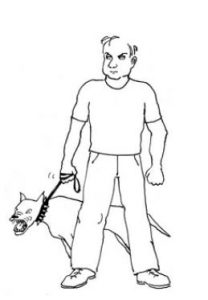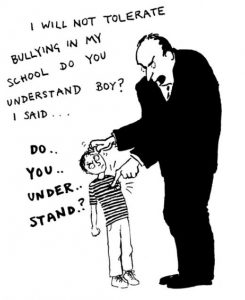The Bully
In my post, The Dominator vs The Friend, I gave a precis of the different personas within the abusive personality. I attended The Freedom Programme for a year and Living With The Dominator became my bible.
Today we look at The Bully

What does the bully thrive on? Intimidation. There are a whole host of tactics the bully will use to intimidate you in addition to actual physical violence.
Warning Signs
Body Language
- Glaring at you
- Staring at you
- Narrowing of the eyes as they look at you
- Making themselves red in the face
- Grinding or gritting the teeth
- Spluttering/foaming at the mouth
- Smiling menacingly – the mouth smiles but the eyes are glaring
- Sneering
- Heavy breathing – huffing and puffing
- Tone of voice – could be quiet, flat & cold, or shouting
- Sulking – you don’t know why, you just know that you don’t know what they’re thinking
- Whistling or humming
- Invading your personal space to intimidate, either getting in your face or approaching you unexpectedly from behind
- Arms folded or swinging
- Foot tapping, finger drumming, finger cracking, fist clenching
- Firing questions at you without allowing you to answer
- Facial tics
- Puffs out chest and draws themselves up to full height to make themselves bigger and more intimidating
- Sitting in an aggressive manner – a man might sit with their legs wide apart, thrusting his crotch forward
Some sound innocuous enough, but when you’re in an abusive relationship you know they spell trouble. At a party and you catch their eye, they smile at you. But it’s a smile that says that there will be trouble later. Your crime? Talking to someone, perceived flirting, being too quiet – could be anything. However, you recognise the lack of warmth in the eyes that no one else notices.
Not everyone who taps their foot or drums their fingers is abusive, obviously. Some people are just fidgets! However, you come to recognise the deliberate tapping or drumming as a warning sign.
Other Subtle Warning Signs
- Perhaps certain words are used that you recognise as warning signs of trouble to come
- Secret gestures which only you recognise as a threat – could be a certain way of scratching the nose, or stroking the chin
- Sending the children to bed – a clear warning of trouble to come
- Pacing up and down
Not So Subtle Warning Signs
- Kicking walls or furniture
- Selectively smashing things – usually your personal possessions, not theirs, especially ones with sentimental value to you
- Banging doors and slamming objects down on surfaces
- Pointing sharply at you
- Making sudden gestures, looking as if they are going to hit you but stopping just before making contact
- Throwing objects at you but deliberately missing you, coming close enough to be intimidating
- Driving too fast when you’re a passenger or driving aggressively
- If they own weapons they could be cleaned in front of you in a manner that is threatening
- Blocking exits
- Hurting pets
- Going out without saying where they’re going or when/if they’re coming back – you are fearful as you have no idea what mood they will be in if/when they return
How The Bully Makes You Feel
You are given the impression that the bully is out of control, they are angry. They are neither. They are using an array of the tactics listed above to intimidate you. You are put on edge, constantly feeling that you are treading on eggshells around them. You breathe a sigh of relief when they go to work. Hearing the car pull into the driveway, or the key in the door immediately puts you on your guard. What mood will they be in? Have they had a good day at work, or was it a bad day, and how will it be taken out on you?
The bully thinks that the way they behave is normal. They have probably used some or all of the tactics all their life to get their own way. They believe that they are strong and in charge. Bullying works in their book because people have given in to them all their life. But do you really want a relationship with someone who bulldozes their way through everything?
They believe that we like to be treated like this, that it’s their job to keep us in check. Like an animal we need to be trained, controlled – and in their eyes, protected. It is they who are superior in physical strength as well as intelligence. They may well belittle you both in private and in public with ‘jokey’ remarks: “Don’t worry your pretty little head darling, you won’t understand, bless you!”; “I’ll do it, you’re not strong enough!” Physical strength is confused for superiority. Violence is seen as being acceptable if someone does something they don’t like. Or to get someone to do something they might not want to do.
Where Does The Bully Get Their Beliefs From
Possible sources:
- Their childhood – perhaps one parent was a bully? They might have learned by example. Perhaps their tantrums elicited the required response and results, therefore bullying works! An adult smacking a child can show them that it’s acceptable to use violence to reprimand someone smaller than yourself if they have done something that was disliked. Being smacked for ‘being naughty’.
- School – they might have been bullied at school, seen that it works and employed the tactics themselves in later life. Or they might have been the bully and got what they wanted all the time. A teacher who was a bully could be another instance of learning by example.
- Sport – aggression and intimidation tactics are often employed in sport. An opponent or team will often “square up” to the other, psyching out the other player or team. Physically and verbally attacking each other or the ref if they don’t like something. Some sports are based on violence to win.
- Society – you just need to watch the news if they’re showing a scene from the House of Commons. All the jeering and shouting down the opposition, is all posturing to intimidate and belittle.
- History – Pat Craven cites ‘The Rule of Thumb’ in Living With The Dominator. This is said to come from a time when it was acceptable in common law for a man to beat his wife with a stick providing it was no thicker than his thumb. Women weren’t allowed to vote fully until 1928 in the UK.
- Socialising – get a group of like minded people together and talking and they will soon back each other’s beliefs up. One might mention that their partner has done something they don’t like. Someone might chip in that the partner should be ‘persuaded/told’ not to do it again in the future, implying that hitting the partner will teach them a lesson.
- Jokes – misogynism (hatred of women) or misandrism (hatred of men) often comes out in sexist jokes.
- The Church – Women were ‘given away’ by their fathers to their new husbands. Women had to promise to ‘obey’ their new husband.
- Armed Forces – Bullying the lower ranks has long been used as an acceptable training technique. Belittling and downright abuse has been used to intimidate and break a persons spirit.
- Movies/Films/TV – Action movies showing violence being used to get their own way. Reality shows where contestants bully and abuse each other in the process of ‘winning’. Interviewers might browbeat and interrupt interviewees rather than give them a chance to answer a question fully.
- Song Lyrics – For decades some song lyrics have been giving subtle and not so subtle messages. “Delilah” was killed by her partner because he was ‘driven to it’ by her having an affair. Tammy Wynette stood by her man because even if she didn’t understand him, she stood by him and forgave him because after all, he’s just a man! Diana Ross begging her ‘baby love’ to tell her what she’d done wrong. Sunday girl’s guy was seen with a different girl.

Do we share the Bully’s beliefs?
Being brought up in the same society with the same influences as the bully we likely share some beliefs. Mr/Ms Right may well have been perceived to be boring where as the bad boy/girl was seen to be exciting. The bully may be seen as strong, someone who can take charge. Historically it is women who have been controlled by men. These days it is accepted that domestic abuse happens the other way around too. For centuries women have been conditioned to be kept by men. Being single seen as a mark of failure. As Pat Craven says, there’s a fine line between ‘protecting’ and ‘controlling’.
Even last week I saw a post on Facebook which asked a hypothetical question. Your husband and your father are arguing. Husband says “get in the car”, father says “sit down”, what do you do? I was the first to comment on the post. My answer was: “Whatever YOU want to do, you shouldn’t be told what to do by someone else!”
How the tactics of the Bully affect us
As I said in The Dominator vs The Friend we don’t fall in love with the abusive person. If they showed us the bully persona immediately we’d walk away happily. But they have drawn us in by this time and we find it hard to believe that they are horrible.
With the bully we can’t relax properly. We are never sure when the next rage/argument is coming. Walking on eggshells becomes an intrinsic part of our daily lives. We cannot contradict them or express an opinion of our own. Our confidence become undermined and we might retreat inside ourselves.
We are so fully controlled that we lose the ability to make decisions of our own. Sleep might elude us because they control whether or not we are allowed to sleep. You might be asleep and they rip the duvet off you to wake you up in order to rant at you.
Apologies are given by us to ‘keep the peace’ even if we haven’t done anything wrong. We believe they are angry so we try to placate them. But what are they angry about? Actually, nothing. They are controlling us by intimidating us. Sometimes we become bullies ourselves to other people when that isn’t our true personality.
Drugs and/or alcohol can ‘help’ us to deal with the situation we find ourselves in. We can become dependent on them.
We might be afraid to be affectionate to our family. The bully might well take it out on our children, or us in private.
The Friend
- Smiles with the mouth and eyes
- Cheerful
- Pleasant
- Sense of humour
- Their relaxed and open posture is welcoming rather than intimidating
- Speaks calmly
- Listens to us, engages in discussion and you can have a reasoned argument with them without fear of retaliation or retribution. They will agree to disagree and accept our right to have a difference of opinion. They don’t have to win every argument.
- Companionable
- Consistent
- If they have a bad day they won’t take it out on you and make it your fault
- They believe in equality and respect others
- They can accept that they’re wrong and admit it
- Believes that no person has the right to control another adult

I love The Fairy Story from Living With The Dominator
Once upon a time there was an unmarried princess who ruled her land wisely and well. She made the laws, collected the taxes and was loved by all her subjects.
One day, when she was sitting by her lake, a frog hopped out of the water. “Hello Princess” said the frog. “I am not really a frog at all,” he continued. “I am in fact, a handsome prince. A wicked witch turned me into a frog. However, if you kiss me I will regain my handsome human form. I will then marry you.
You can have my children and care for them. I would like about eight. You can wash my clothes and cook my meals. You can keep the palace clean and tidy. I will take over as ruler and enforce the laws. I will be King. I will collect the taxes and keep all the money. I will of course give you a generous allowance for household expenses.”
Later that night, when the princess was dining on sautéed frogs’ legs in a tarragon, cream and brandy sauce, she said to herself, “I don’t fucking think so!”
